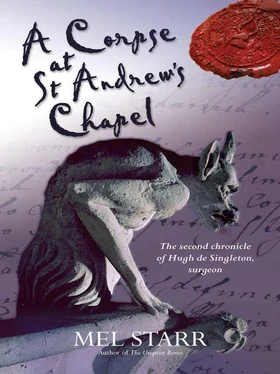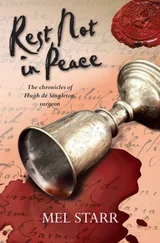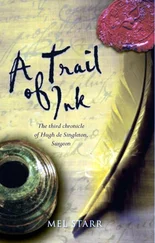Mel Starr - A Corpse at St Andrew's Chapel
Здесь есть возможность читать онлайн «Mel Starr - A Corpse at St Andrew's Chapel» весь текст электронной книги совершенно бесплатно (целиком полную версию без сокращений). В некоторых случаях можно слушать аудио, скачать через торрент в формате fb2 и присутствует краткое содержание. Год выпуска: 2010, Издательство: Kregel Publications, Жанр: Исторический детектив, на английском языке. Описание произведения, (предисловие) а так же отзывы посетителей доступны на портале библиотеки ЛибКат.
- Название:A Corpse at St Andrew's Chapel
- Автор:
- Издательство:Kregel Publications
- Жанр:
- Год:2010
- ISBN:нет данных
- Рейтинг книги:5 / 5. Голосов: 1
-
Избранное:Добавить в избранное
- Отзывы:
-
Ваша оценка:
- 100
- 1
- 2
- 3
- 4
- 5
A Corpse at St Andrew's Chapel: краткое содержание, описание и аннотация
Предлагаем к чтению аннотацию, описание, краткое содержание или предисловие (зависит от того, что написал сам автор книги «A Corpse at St Andrew's Chapel»). Если вы не нашли необходимую информацию о книге — напишите в комментариях, мы постараемся отыскать её.
A Corpse at St Andrew's Chapel — читать онлайн бесплатно полную книгу (весь текст) целиком
Ниже представлен текст книги, разбитый по страницам. Система сохранения места последней прочитанной страницы, позволяет с удобством читать онлайн бесплатно книгу «A Corpse at St Andrew's Chapel», без необходимости каждый раз заново искать на чём Вы остановились. Поставьте закладку, и сможете в любой момент перейти на страницу, на которой закончили чтение.
Интервал:
Закладка:
Henry atte Bridge’s widow — though as yet she did not know her condition — was a worried woman. After a long winter we were all a bit waxy, but she was ashen, with dark shadows under her eyes from a sleepless night. There would, I thought, be more nights like that in the woman’s future.
Hubert Shillside stood beside the vicar at the door. Neither man held aloof from a dinner table, so Emma did not at first see the object of our visit lying in the dirt behind them.
Father Thomas came quickly to the point of our call. When his words were complete he stepped back so the woman could see clearly the lifeless form of her husband. She choked out a brief wail, which brought her children to the door, but then became silent. She raised one hand to her mouth, and with the other restrained her eldest son, who would have pushed past her to better view his father.
Thomas de Bowlegh remained with the woman to arrange her husband’s burial while Shillside and I and the others but for one clerk drifted away toward Mill Street and the town.
“’Tis a murder the bishop must deal with,” the coroner said as we approached the bridge.
“Aye, which means the vicars of St Beornwald’s will have added duties,” I agreed. I was relieved. Searching out Henry atte Bridge’s slayer would not be my obligation, for he was the bishop’s man.
I parted from Hubert Shillside, and those of the coroner’s jury who remained, at the Mill Street and headed for the castle. I had eaten nothing this day, and hunger burned my belly. But I had another task first, before I could consume a cold dinner.
I sought Alice in the scullery, and found her finishing her work for the day. She looked up enquiringly from under a stray wisp of hair, which she swept aside with the back of her wrist.
“Were you told that your brother was missing?”
The girl shook her head. “Nay…which one? Henry or Thomas?”
“Henry. He has been found.”
Perhaps it was the tone of my voice, or the manner of my speaking, but the girl stopped her scrubbing at a pot, wiped her hands on her apron, and watched me intently, waiting for an explanation.
I told her what had happened, or so much of what had happened as I knew, omitting only the fight along the road the night before.
“So ’e was murdered, then,” she concluded. This was a statement, not a question, as if the manner of her brother’s death was not a shock to her.
Although he was not Lord Gilbert’s man and was no concern of mine, I had many questions about this death, and thought I might assist the vicars in their search for a killer. It did not seem to me at the time unnatural to be curious about the fate of one who had tried to do me harm.
“Had your brother enemies?” I asked. I thought I knew the answer to that question.
“Had better ask had ’e any friends,” she replied.
“There were many, you think, who wished him ill?”
“More’n would’ve wished ’im well, I think.” The girl looked away and silently focused on the scullery window, now glowing bright from the setting sun. “’E learned young ’e was stronger’n most an’ could ’ave ’is way of weaker men…so I’ve ’eard.”
“Even a weak man is strong enough to plunge a knife into another,” I said.
“A weak woman, also,” the girl added, and returned to her pot.
Her assertion got my attention. “Think you there are women who wished your brother dead?”
“Ask Emma,” the girl sighed.
“He beat his wife?”
“Aye. More’n most. When I was with me father, livin’ at the Weald, before you brought me ’ere, I heard ’er yellin’ an’ gettin’ smacked about.”
“Often?”
“Reg’lar, like…’specially when ’e was drunk.”
“He was drunk often?”
“Ev’ry Saturday, reg’lar like. None in the Weald could sleep ’til ’e had done knockin’ Emma about an’ she stopped screechin’.”
The killer of a man who has made many enemies may successfully elude apprehension. It is the killer of a man with few enemies who, it seems to me, is most likely to be caught. The vicars faced a daunting task.
Alice curtsied and smiled thinly as I turned to go. The girl really had grown quite fetching, though far beneath my station. Well, whether a woman is beautiful or not has little to do with her rank. Consider the number of gentlemen who take a mistress from the commons while wed to some ill-favored lady whose attractions of land and dowry could not for long make up for her appearance or demeanor.
I called next door at the kitchen and requested a meal from the unhappy cook, who until my appearance had thought his work complete for the day.
Alice was sent with my meal. As I ate I thought of shoes and blue yarn and murder. And, yes, of the child Alice also, who, quite disconcertingly, was no longer a child.
Hubert Shillside called for his coroner’s jury to meet Monday morning in the church. As I had no pressing business, I attended. All there had seen the puncture in Henry atte Bridge’s hairy back. No other cause of death was apparent. The jury soon decided that the death was murder, though none who voted so seemed much grieved at the loss. As I left the church I saw Hubert Shillside enter into a solemn conversation with two of the three vicars of St Beornwald’s Church, while a flock of clerks circled nearby.
I had brought with me to the church the shoes from Henry atte Bridge’s feet. I was confident they had once protected the feet of Alan the beadle. As I walked from the churchyard I heard from a distance a thin keening. I stopped and turned to my right where, at the corner where Church View joins Bridge Street, I saw a funeral procession come into view. There were few mourners. A dozen men and women and a scattering of children followed Simon Osbern and the bier.
I made my way down Church Street to the High Street, then walked left on Catte Street until I came to the house of Alan the beadle. Matilda was pleased to see me, or pleased to see the shoes, I know not which. She did not ask how I recovered them, and I did not venture to tell her. We made small talk for a time; she was getting on well, thank you; her son missed his father, did not sleep well for many nights after the funeral. Neither did she. But wasn’t it fine weather we enjoyed? And the early onions and cabbages were sprouting nicely.
I departed Catte Street in a better mood than I had entered. Certainly the warming sun at my face had something to do with my good humor, but a light conversation with an attractive woman had some small part in my rising spirits. I am not well versed in such things, but I believe Matilda might have been flirting with me. Either that, or she had some speck in her eye which caused her to blink uncommonly often.
I intended to return to the castle and seek my dinner, then be about Lord Gilbert’s business for the afternoon. But as I reached Church View while making my way down Bridge Street, I glanced north and saw a clot of mourners just inside the churchyard wall. I turned and walked to the church.
The gravediggers had nearly completed their work as I reached the lych gate. Henry atte Bridge would rest just within the southeast corner of the churchyard, a few paces from Alan the beadle. I entered and watched as Father Simon spoke the final collect and Henry was lifted in his shroud from the plank which formed his bier. The shroud was black, as befits such occasions, but ill made and poorly stitched.
As his brother and another lifted Henry from the plank, the seam of the shroud split, spilling the dead man’s arm from its place. The arm lay in an old, tattered sleeve of faded blue.
I pushed my way to the front of the mourners, a thing easy to do as there were so few of them. And of those in the group I believe few mourned. Thomas atte Bridge and his assistant set Henry down beside the open grave to repair the shroud and replace the drooping arm. Before they could take him up again I reached between them and seized the badly frayed cuff of the blue cotehardie in which Emma had chosen to bury him.
Читать дальшеИнтервал:
Закладка:
Похожие книги на «A Corpse at St Andrew's Chapel»
Представляем Вашему вниманию похожие книги на «A Corpse at St Andrew's Chapel» списком для выбора. Мы отобрали схожую по названию и смыслу литературу в надежде предоставить читателям больше вариантов отыскать новые, интересные, ещё непрочитанные произведения.
Обсуждение, отзывы о книге «A Corpse at St Andrew's Chapel» и просто собственные мнения читателей. Оставьте ваши комментарии, напишите, что Вы думаете о произведении, его смысле или главных героях. Укажите что конкретно понравилось, а что нет, и почему Вы так считаете.












